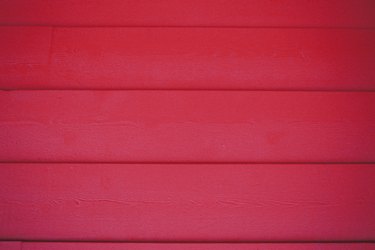 Semi-gloss paint reflects light slightly, brightening the colors. Image Credit: Amos Morgan/Photodisc/Getty Images
Semi-gloss paint reflects light slightly, brightening the colors. Image Credit: Amos Morgan/Photodisc/Getty Images
While semi-gloss paint is defined by the amount of sheen a paint of this type has, latex paint is categorized by the main ingredient — which may be a natural or synthetic latex. Semi-gloss latex paint is, in fact, quite typical for use on interior walls because it dries quickly, is simple to clean, and makes surface colors brighten without highlighting blotches and imperfections.
Semi-gloss
Semi-gloss is a common type of finish used for interior and exterior painting. It's also referred to as eggshell, velvet or satin, depending on the subtle differences in finish. A semi-gloss reflects more light than a flat matte paint, but is not as shiny as a high-gloss finish. Since they tolerate moisture well, they're commonly found in high-traffic areas such as kitchens and children's bedrooms. Semi-gloss paints may be made from latex, other water-based substances or oil.
Latex
Latex primers and paints are water soluble and are traditionally made with a base containing actual latex. However, the term "latex" may also apply to an artificial blend. Latex makes these paints simpler to clean and quicker to dry, with less mess involved during application. Latex is common on interior and exterior surfaces.
Other Paint Finishes
A variety of alternatives to a semi-gloss finish offer differing qualities to a surface's ultimate color and texture. A flat paint gives off no sheen, absorbing the color and making it appear darker. This type of finish works well to hide walls, old wood and other surfaces with blotches, blemishes and irregularities. High-gloss paints, also called enamels, provide a tough, water-resistant finish and are very simple to clean. Because this finish highlights blemishes and imperfections, however, its typical use is limited to trim, window frames and doors in high-use rooms.
Other Paint Types
Acrylic or synthetic water-based paints do not contain latex but mimic its qualities. Paints labeled "oil" may also contain an alternative synthetic alkyd. Some primers come in an alcohol base to cover and seal areas with water spots, knots and other stains or blemishes that would otherwise show through other types of paint.


